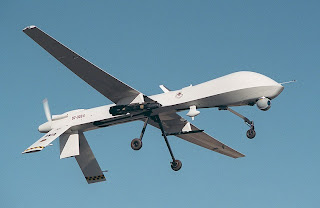This post is a LONG overdue response to Peter Somerville, who had some questions about a post I wrote way back in October on the morality of drone strikes.
Here’s a quick excerpt from Peter (not a full recap, so click over and read it)
Given that Leah’s post falls under a series on the topic of sinfulness, I was surprised that she never identifies any sinfulness in her post. Does she believe that a soldier killing an opponent is sinful? Is a soldier killing a noncombatant sinful? Are voters and politicians sinful for insulating themselves from the true costs of war? If this last is true, then these civilians are in a situation entirely of their own making.
(Im)morality among Soldiers
Is it sinful/wrong to kill an enemy in battle? Is it wrong to kill someone threatening your family in your home?
To answer either of these, it’s probably necessary that I explain what I’m talking about when I use the word ‘wrong’ or ‘sinful.’ I’m a deontologist when it comes to morality, so I care primarily about motive for action (or development of practical wisdom, for all you Aristotelians out there).
This means that the lesser of two evils remains evil and harmful, even if it’s necessary. One way I like to explain it is that immoral actions can be explained but never excused.
In the example at hand, when I deliberately take a life, whether on the battlefield or in my home, I am overriding my conscience and my instincts, which are repulsed by murder. These moral habits help me behave correctly, and any attempt to transgress them could weaken them in the future. Thus, I harm myself by weakening my safeguards against immoral action.
Whether or not my decision was necessary (and I would agree that it can be necessary to kill to prevent grievous harm, i.e. when someone would otherwise kill your child, assassinating Hitler, etc) the harm I have done to myself remains. The act remains a transgression and is not justified or excused by its necessity.
I do think any kind of killing, whether in war or in peace, is wrong and sinful, even if it may be necessary. However, this type of sin is less terrible than the sin of civilians who deliberately, without sufficient reason, place soldiers in situations where every choice is sinful.
(Im)morality among Civilians
During the Vietnam War, the Viet Cong sometimes used children as suicide bombers. Today the practice has been revived in Afghanistan and Iraq. To prevail, US Soldiers had to train themselves to look at a child and see a threat. This is a horrific habit to adopt, and civilians are at fault when they ask soldiers to make this kind of mental adjustment except in direst need.
When we send our army into war, we are asking them, in essence, to be sin-eaters, to take on a disproportionate share of the moral cost of the preservation of our lives and our country. Even if their sacrifice is willing, we are wrong to ask it, particularly now, when we have so anesthetized ourselves against the true cost of their sacrifice.
Two notes: in the post that sparked Peter’s response, I incorrectly stated that the figure of 80% of troops failing to fire at the enemy in battle was from the Vietnam War. It is from World War II. These numbers spurred the Armed Forces to switch to human-shaped targets, rather than traditional target shapes.
Also left out from my original post: drone strike operators are also at risk for PTSD, especially as their jobs sometimes require them to hover over the site of a missile strike, assessing the damage in high-def.













